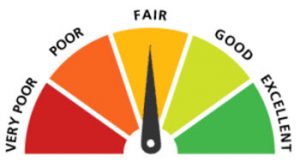The exact formula used by the FICO company to calculate FICO scores is secret, but FICO has released information about factors that can impact your FICO score. Learn about these factors and put the information to use in your quest for a better FICO score. There are a lot of things one can do to improve ones FICO score, and prevent it from being damaged.
For more general information about FICO scores, please visit our article About your FICO score.
LARGE IMPACT ON YOUR FICO SCORE
 Your current debt burden, your debt to limit ratio, and any history of not paying back debts on time are two factors that can have a huge impact on your FICO score.
Your current debt burden, your debt to limit ratio, and any history of not paying back debts on time are two factors that can have a huge impact on your FICO score.
Examples of factors that can seriously damage your FICO score are late payments, bankruptcy, lien due to non-payment, charge offs, repossession, and foreclosure. Certain judgments and settlements can also be bad for your credit score. Owing money due to a court judgment or tax lien tend to be very damaging.
When it comes to current debt burden, the situation is less black and white. Having large debt doesn’t automatically mean that your FICO score will be low. It is true that having a lot of debt – especially unsecured debt – can negatively impact your FICO score even if you aren’t missing payments. On the other hand, a big home mortgage loan that is well-maintained doesn’t scream low creditworthiness, especially not if it is in line with the person’s income and the debt-to-value ratio for the mortgage loan looks good.
If you have one or more credit cards, FICO will take your debt to limit ratio into account when calculating your FICO score. Having the credit cards maxed out or nearly maxed out is negative.
Other examples of factors that are likely to impact your FICO score negatively is having a large number of accounts with balances, having one or more newly opened consumer finance credit accounts, and having installment loans that you haven’t paid down much yet.
MEDIUM IMPACT ON YOUR CREDIT SCORE
The length of your credit history is important, but having a long history of managing credit well will not protect your FICO score from plummeting if you start missing payments, racking up credit big card debts, having a car repossessed, and so on.
Since it takes time to build up a high FICO score, it is a good idea to start managing debt at an early age. A common misconception is that you can keep your FICO score “clean” by never utilizing credit. After all, if you never use credit, you can never get into a situation where you don’t pay back on time, where you carry a huge debt burden, and so on. The problem with this type of thinking is that having no credit history or only a very short credit history is actually bad for your FICO score. Prospective lenders want to know how you handle credit. With no credit history, you will be a bit of a dark horse.
When it comes to length of credit history, the FICO company will chiefly look at the age of your oldest credit account and the average age of all your credit accounts.
MINOR IMPACT ON YOUR FICO SCORE
The fact that something is listed in this section doesn’t mean that you shouldn’t care abut it. Even small changes in your FICO score can have a big impact on your perceived creditworthiness, especially if you are close to a cut-off point. It is also important to realize that a lot of small factors can have a big impact when put together.
- Types of credit used

It is good for your FICO score if you have a history of handling different kinds of credit well, e.g. mortgage loan, car loan, revolving bank account credit, credit card, etc. Of course, this doesn’t mean that you should go crazy and apply for a huge number of credits.
- Number of inquires for credit
Credit inquiries will be displayed on your credit report for two years, but they will normally only impact your FICO score negatively during the first year. FICO is also aware of the fact that a lot of inquiries within a short time-frame can be the result of a savvy consumer shopping around, trying to obtain the best possible credit offer. A lot of inquiries within a short time-frame can therefore be lumped together and only count as one inquiry when the FICO score is calculated.
- Miscellaneous
Having pulled your own credit report or credit score does not lower your FICO score.
A credit report or credit score pulled for employee verification does not lower your FICO score.
A credit report or credit score pulled for a pre-screened offer of credit or insurance does not lower your FICO score.

